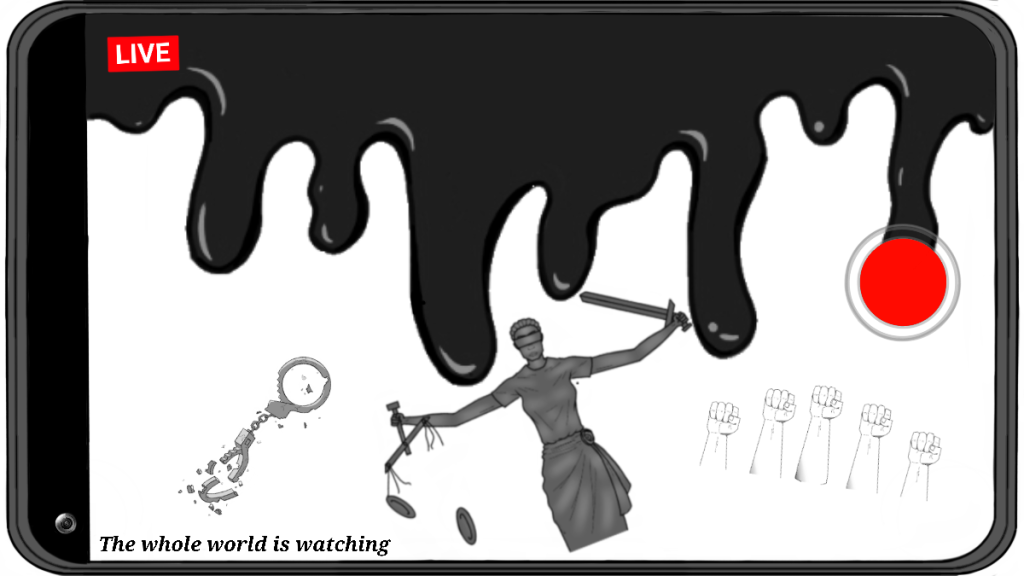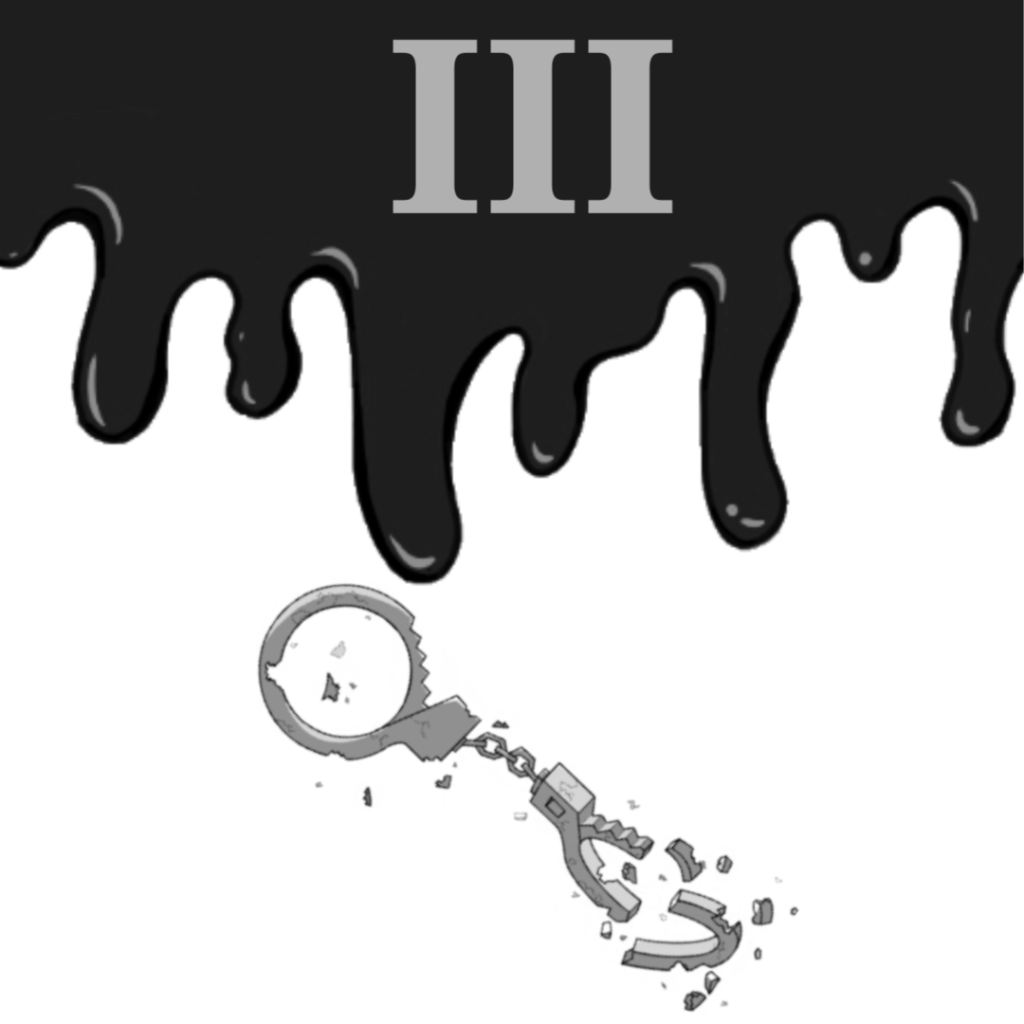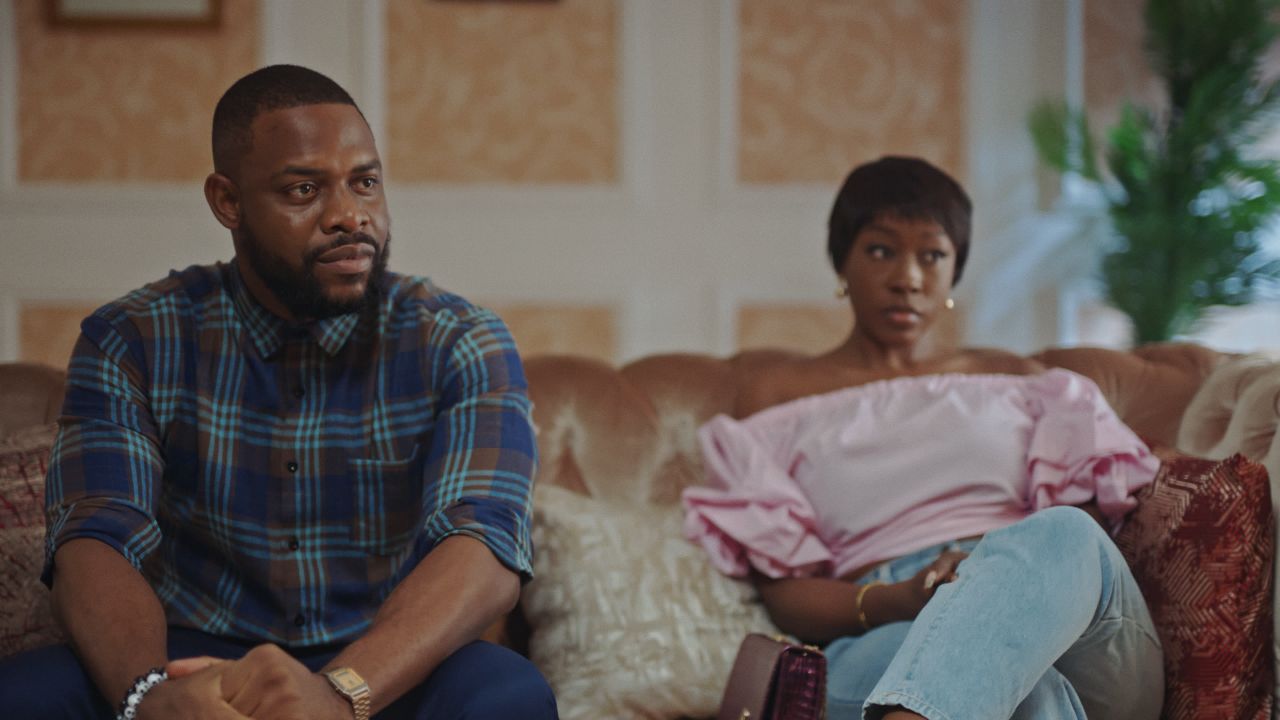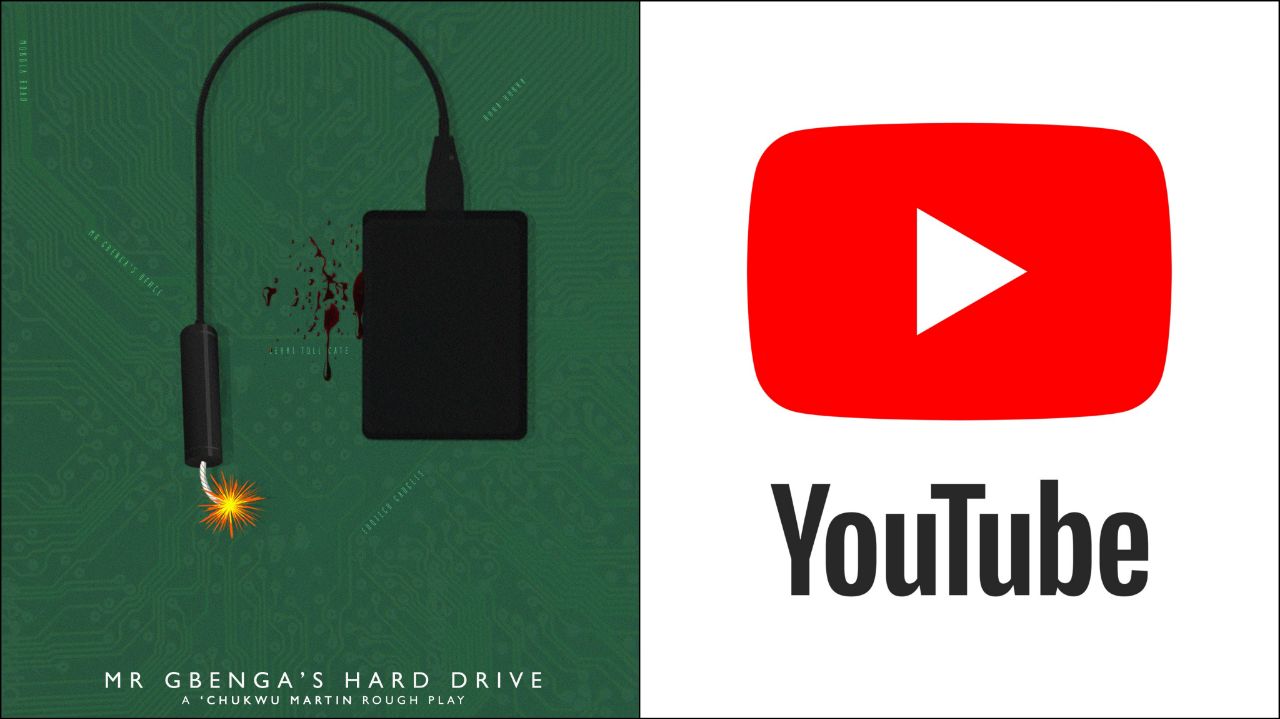
Contact: instagram
I witnessed two coincidental events that occurred three days apart between the third and fourth quarter of 2020. Both events were about a group of people who were violently abused and subjugated to subhuman lawlessness by law enforcement officials. And while the gruesome acts visited upon the groups were expressed as covertly as possible by the perpetrators, the climax of the violence for each event was vocal and public, in a court of law, in cohort with a Judge.
The first occurrence was Aaron Sorkin’s 2020 movie, The Trial of the Chicago 7, which I saw on September 30, 2020, five days after its release on Netflix. The second, more immediate and more cataclysmic, was the protest against Nigerian Police brutality, its nascency being the death of a young man in Delta state at the hands of SARS (Special Anti-Robbery Squad) officials, just three days after I saw Aaron Sorkin’s film.
In Aaron Sorkin’s movie, which is based on true life events, a ragtag group of leftist, anti-war protest leaders organise a protest against the 1968 Vietnam War. The protest devolved into a riot that saw numerous people injured by the police. The organisers, seven of them, were arrested and charged to court. This movie is about that lengthy trial. After seeing the movie, I walked around my days as Aaron Sorkin’s dialogues, concise, witty, and consistently poignant, swam around my head like a bell clapper. Something inexplicable about the movie had left me as dazed as a dead thing in the sun. But I didn’t know what it was.
Three days after I saw this movie, the horrifying clip of an unknown man shot dead by SARS in Delta state circulated the Nigerian internet space. On WhatsApp, Twitter, Facebook, there was a tacit race, as there usually is when tragedy strikes, for who would bring this news first to whom. In doing so, the death of this unknown man was proliferated and multiplied on the neat circles of WhatsApp status updates, tweeted about, debated upon, presented for political points,while his life, and what it could have been, remained uninteresting.
It was at this time, after reading those opinions on his death, that I suddenly realized what tore at me about The Trial of the Chicago 7: They weren’t 7, there was an 8th man, Bobby Seale (played by Yahya Abdul-Mateen II), a black man and cofounder of the Black Panther party.

Q from The Trial of the Chicago 7: “who started the riots; the protesters or the police”
answer: “the police don’t start riots.”
In the 2h 10m movie, the question the trial sought to ascertain was a straightforward one: who started the riots, the police or the protest organisers? After the Delta man was murdered and his vehicle was stolen by SARS operatives, an official statement was released, denying the allegations. The unknown man whose death had multiplied on our phones, and had thus, died many times, had suddenly been declared undead, and eviscerated as a lie.
It cannot be ascertained that this blatant falsehood was what angered the Nigerian populace. It is easier to consolidate the years of brutality suffered at the hands of armed forces as the trigger. But the people came out in an unprecedented throng and they protested with a new fervor. The days that followed saw placards raised as high as flags, the new banner of allegiance to a new country, new demands for a police reform, and, morbidly, an old type of violence crept up to counter the largely peaceful protests.
The Nigerian government remained curiously quiet about the national upheaval. And just as in Sorkin’s movie, the government tried to shut down the protests —and it failed. The protesters were adamant. It felt, to them, that this was an opportunity to express national grievances that had been left unsaid since 1999. If the protests in The Trial of the Chicago 7 were important to save the lives of young men being drafted to the war in Vietnam, then the nationwide Nigerian protests were to save the soul of the country, a wild dash at freedom, however illusive or undefined that concept is in the Nigerian political milieu.
To ask what freedom from this government means to the average Nigerian, one must first ask, which Nigerian? Is he Igbo, Yoruba, Hausa, or the other plethora of tribes? The North obviously needs an overhaul of its education structure; the East would most likely demand more political fairness that would see them hold more positions of authoritative political power (we do not know the next time an Easterner would become President—in a country with so many tribes, we’ve had more Northern presidents than any other tribe, and it is not because Northern leaders are better); and the Yorubas are chameleonic, making it difficult to ascertain a unanimous want for them.
Simply put, the country was too divided on tribal lines, thus incapable of approaching the protest beyond its fundamental nationwide cause: police brutality. Once it moved ahead of that cause, cracks that were present before—lack of central leaders for the protests to dialogue its purposes through, lack of a unanimous national character, and the lack of a suitable approach to convincing indifferent Nigerians to join beyond sheer bullying (soro soke)— widened and swallowed the protests. The absence of political pragmatism left loopholes that dissidents, intellectual oppositions, and nefarious politicians could exploit and, quickly, the protests predictably devolved into riots across the country prompting several Governors to declare curfew in their states.
The genuine protesters knew they had an unexpected opportunity, they just didn’t know how to continue from that point. The Federal Government had disbanded the notorious SARS operative for the umpteenth time; celebrities had joined the protests; the nation had grounded to a halt, and held its breath to watch. Then the Federal Government, like a dangerous reptile pursued into a corner, lashed back in panic.

the question of memory
In his book, In Praise of Darkness, the Argentine writer, Jorge Luis Borges, writes of memory: “we are our memory, we are that chimerical museum of shifting shapes, that pile of broken mirrors.” To reconstruct memory in a literary medium is to fail, always. A cog will go missing, an image will shift, forcing the narrator to harmlessly replace fact with a slight variation.
I am trying to capture a moment from the protests but I know it is futile because the moment itself is a photograph, already by its medium, an attempt to capture another moment in time. To capture a strand of memory is already problematic; to attempt two, that’s near insurmountable. But it must be done to properly honour the dead.
The climax of Aaron Sorkin’s The Trial of the Chicago 7 is deliberately disjointed, a series of scenes from different perspectives relayed from memory by the witnesses in the dock. Not only does this narrative technique increase the tempo (aided by the brilliant composition by Celeste and Daniel Pemberton), the confluence of accounts from various characters causes the audience to distrust each witness’ account. But Aaron Sorkin is a master storyteller; he consolidates these scenes authoritatively and nudges the viewer towards whose truth is being relayed, whose memory. This is a technique employed throughout the movie, showing that there is a wealth of ingenuity between Aaron Sorkin and the movie’s editor, Alan Baumgarten.
There is a plethora of iconic images to select from for my purpose. A number of undiluted memories to present.
- A young man stands aloft other protesters. He holds the Nigerian flag in his hand and waves it, although it is a photograph, the illusion of motion is present in the curls and curlicues on the flag.
- At a protest along Secretariat road, Ìbàdàn, a middle-aged woman in a Toyota locks eyes with a group of protesters then she slits her throat with her forefinger. I am one of those protesters. Woman protected by the illusive sheen of middle-class wealth, memory reclaims you.
- On October 20, 2020, at Lekki tollgate, in Lagos state, protesters gathered in defiance to the state governor, Babjide Sanwoolu’s declared curfew. The photograph captures this memory without fail but the essence is absent. This crowd is zestful and exuberant, its defiance represents a statement of patriotism. Everywhere else beyond the photograph, the country holds its breath, waiting. But this crowd too, beneath its exuberance, holds its breath. We cannot deduce this emotiveness from a picture, but we know because, like the first video of that murdered man in Delta, this image multiplied on our mobile phones, our hope piled on its mass of subjects; the last bastion of hope. And now, we all know what followed.
After the protesters are surrounded and right before the protest leaders are attacked in Aaron Sorkin’s movie, there is a quiet moment which Abbie Hoffman (Sacha Baron Cohen) describes. He says, “And we see a cop do something you don’t wanna see a cop do.” Subsequently, the police officers remove their badges and name tags, then they attack the protesters.
An invisibility of that nature was employed at the tollgate in Lekki, too. An enforced unseeing that precipitated the shootings of unarmed protesters, the sullying of a Nigerian flag, the flippant cessation of life, all under the political cover of darkness. This isn’t the first time soldiers have murdered innocent civilians in this country, but we are a people of forgetfulness. This deliberate forgettery is a coping mechanism. What is there to remember in our collective history? The horrible leadership we’ve had post 99′? The long dark history of military rule? The Civil war? The colonial rule? Our plethora of internecine wars? Yet, memory, albeit coincidentally, shifts shapes and aligns again.
On October 20, 2001, during Olusegun Obasanjo’s administration, Nigerian soldiers stormed several small villages in Benue and massacred over 500 people in an apparent retaliation to the killing of 19 soldiers in the area by Tiv militia. In another incident in late 1999, troops were deployed to Odi, in Niger Delta, and murdered civilians after 12 police officers were killed. History is the reflection from the mirrors of memory, and Nigeria isn’t sequestered from this definition.
- OKE OBI-ENADHUZE. He is a multilayered memory because he lives in a photograph. Here, he isn’t dead. He is a man in white, with recommended glasses, in love. The serenity of the picture is antithetical to what his country did to Oke. Man in glasses holding on to your lover in the foreground of a resort, death awaits you at the bend of time. Oke’s fate is that of the 300 million Nigerians. We mourn him because of the tragedy of severed potential. How he died matters little, where, matters even less, but in whose hands, whose gun did the stray bullet wander from? Whose hands stabbed him? Did the person, as Teju Cole wrote in Known and Strange Things, premeditate, and over how many hours or seconds? Was the final moment of pulling the trigger or stabbing that knife “accompanied by the weight of the moment preceding it, moments necessary to establish that quantum of moral disregard out of which one person kills another.” Or did the comfort of victim anonymity dispel any form of moral accountability?
Days after I attended the protest at Secretariat road, Ìbàdàn, where an anonymous woman in a Toyota slit her throat with her forefinger at me and other protesters, I quickly forgot what she looked like but not what she represented. I have always had an awful memory, but I remembered her forefinger; the dark knuckles, the golden ring around it that had collected a shimmer of sunlight, the clean motion of the slit, as if she had done it several times or she’d seen it done severally. Yet, sometimes, the image fizzles out, and I am no longer sure whether she had a ring on that finger or she had bangles around her hand instead. My memory falls, as all memory, to questioning. But what remains unquestionable is the certainty in her eyes, and the certainty in my mind, that if she had a gun and she found us on a darkened bridge, she, too, might have pulled the trigger.

the wild cards
According to The Trial of the Chicago 7, Bobby Seale had never met the protest organisers until the indictment. He had only been to Chicago to make a speech. In fact, he was in Chicago for just four hours. Seale was lumped into the trial because he was a black man, member and co-founder of the Black Panther, and would make the group scarier, consequently, receiving lesser public pity.
But, the judge presiding over the trial, Julius Hoffman (Frank Langella), had Bobby Seale (Yahya AbdulMateen II) gagged and bound in a court of law, literally, after the latter wouldn’t stop complaining that he had not been assigned a lawyer of his choice. The sight of a black man repressed after Martin Luther King Jr. and Fred Hampton had just been assassinated tilted power away from Judge Julius Hoffman in the movie. It was an unexpectedly touching moment, and Bobby Seale, unconsciously, had become a wild card. His case was declared a mistrial but he went on to jail, albeit not for the crime he was initially apprehended for (killing a cop in Connecticut) but for the charges of contempt graciously doled out by Judge Julius Hoffman. The statement for freedom was made, but at what cost? Eromosele Adene (27), charged to court for organising protests against Police brutality in Lagos. He, also, is a wild card. He too, freed in the end, but, again, at what cost?
At the end of the trial, Tom Hayden (Eddie Redmayne), one of the accused, in his final speech addressed to the courthouse, defiantly read the names of the 5000 deceased American soldiers who had died since the trial began. It was a “fuck you” to authority. A reminder of the reason the protest held in the first place, and the cost of ignoring its demand.
What is the cost of the Nigerian revolution? (And consider the word revolution a misnomer, an exhaustive word that has lost its lustre and potency at this point. I have found that when the word is called upon now, in our modern chaotic world, it is usually utilised ignorantly. But, for a lack of an equally efficient synonym at this time, its redundancy must be endured.)
We need, at best, a unanimous character and vision to approach what now appears to be an inevitable “revolution”, and, at worst, a common understanding of our problems. We have wild cards, but they haven’t been dealt, or, their motivations haven’t been properly expended. Although it is impossible to account for all those who have died directly or indirectly at the hands of brutal police actions in Nigeria, here is an attempt to list our wild cards:
Oke Obi-Enadhuze, Kazeem Tiamiyu (21), Tina Ezekwe (16), Chibuike Daniel Ikeaguchi (20), Kolade Johnson, Musaib Sammani (22), Chima Ikwunado, Ogah Jumbo (36), Emmanuel Egbo (15), Godgift Ferguson Ekerete (24), Tony Oruamo (21), Harry Ataria (26), Mbakwe Oruama (20), Daniel Adewuyi Tella (27), Christian Onuigbo (28), Chika Ibeku (29), Gabriel Ejoor Owoichu (29), Precious Odua (27), Modebayo Awosika, Peter Ofurum, Linda Igwetu, Chinedu Ani, Chukwuemeka Mathew Onovo, Johnson Nnaemeka, Steven Agbanyin, Chidi Odinauwa, Ifeoma Abugu, Iloanya Chijioke John…
then add your name afterwards, because you could easily be next.
Graphic designs: Salako Tofunmi
Contact: instagram





Very brilliant. I love the diction. It’s expository and yet beautiful with story telling technique.
It was worth reading #Deep sigh#
This piece is both haunting yet gentle. Ola helps us relive or reminds us of a period we would best keep in the deep recesses of our minds through a medium we most relate to: a movie. This moved me greatly.
Omg! Olamide writes so well. What? It’s like something Wole Soyinka would write. Or not. I don’t know. I haven’t read any of his books in a while. The point is, he writes beautifully. Well done Olamide!
Sigh, this is so sad. It just shows us that the world is a very cold place. In Nigeria, in America…different continents. In 2020, in 1960…different eras. And the same thing has happened. Sigh.
We can only blame ourselves. The human race is inherently wicked. I remember the first time I learned the word inherent. It was when we read Lord of the flies in Maverick. I don’t remember that literature teacher’s name right now but she explained what it means. And said that humans are inherently wicked. Now, I really understand what she meant.
Sigh. We can only pray to live a good life, and pray our loved ones and their loved ones do the same too. I really don’t think there’s any hope praying for Nigeria or praying for the world because I think the same bad things would keep on happening.